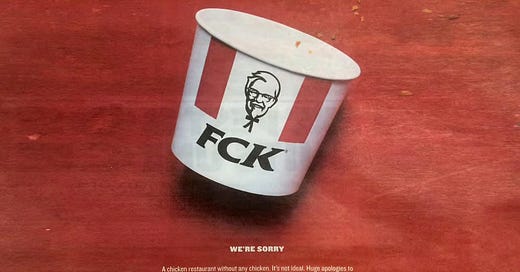The one word to cut your complaints in half
Sorry. It’s the single most important word when it comes to your customer service.
The other day, I was having a get-together with some friends. As the conversation meandered through topics – and our cheeks reddened – we eventually stumbled onto car accidents.
“So a friend of mine was rear-ended and the nutter had the gall to take her to court because she’d ‘admitted blame.’ Can you believe it? I told her – you shouldn’t have said sorry – everyone knows that.”
“Well, actually…” I said, because I’m an annoying git. “I don’t think she did anything wrong there.”
Saying sorry isn’t admitting blame
First up, just because you say sorry doesn’t mean you’re saying it’s your fault. You’re just showing empathy. For example, if someone bumps into you, it’s quite natural to blurt out an apology. In fact, it’s as instinctive as saying ouch (in the UK, at least).
Don’t believe me? Well, the law actually has your back. In the Compensation Act 2006 it says:
“An apology, an offer of treatment or other redress, shall not of itself amount to an admission of negligence or breach of statutory duty.”
Basically, saying sorry isn’t saying you’re in the wrong. The Ministry of Justice is looking to make this even clearer.
“Those defending claims have been nervous about making an apology as they fear that saying sorry is in some way an admission of liability and weakens their case. This is unfortunate as the giving and receiving of genuine apologies may play an important role in the dispute resolution process across a whole range of areas of law by reducing adversarial behaviour and the potential for disagreements to escalate.” – From Reforming the law of apologies in civil proceedings.
The paper goes on to explain that other countries have similar laws – such as the US, Australia and Canada.
Saying sorry can diffuse a situation
There’s an interesting point in that paper – saying sorry can actually help calm a situation down. There’s a load of evidence that proves this.
The University of Nottingham found that people are more than twice as likely to forgive a company that says sorry over one that offers them cash. And the Carey School of Business found that saying sorry doubled customer satisfaction. (It rose 37 percentage points from 37% to 74%.)
It even applies in the most notoriously litigious industry – healthcare in the US. The University of Michigan let their hospital staff say sorry. While I’m sure the lawyers were dropping bricks – thinking they were going to get loads of malpractice suits – the opposite actually happened. Annual claims massively dropped, they resolved claims far quicker, and their legal expenses more than halved.
So why don’t people apologise more?
The problem is upside-down thinking
People don’t say sorry because they’re looking at it all wrong. We imagine that saying sorry could get us into trouble.
But it’s not saying sorry that’s going to get you into trouble. If you crash into someone else, release a faulty product, or just give really bad customer service – you’ve already messed up. Sure, it might not directly be your fault – maybe it was some third party you brought in or a freak accident. Either way, the customer is angry.
And half of those people will stay angry no matter what you do. They deserve to complain – remember, you messed up. Saying sorry isn’t going to make them complain more.
Take the car accident. That nutter was going to take the friend to court whatever she said. Her saying sorry didn’t cause that. She was just unlucky. Most of the time, people just want you to acknowledge how they’re feeling and show you care.
It works the other way, too. If you crash into someone else, you’re not going to get away with it just because you stayed quiet. You’re looking at the problem the wrong way around.
Saying sorry doesn’t make things worse, but it could make them better.
So how do you apologise?
According to the Ohio State’s Fisher College of Business, there are six parts to a good apology, from expressing regret to asking for forgiveness. But you don’t need to include them all. Roy Lewicki, the lead researcher says:
“Our findings showed that the most important component is an acknowledgement of responsibility. Say it’s your fault, that you made a mistake.”
So I’d trim down their advice and make it a bit simpler to follow. Here’s how I’d structure your apology:
Say: “Sorry.”
If it was your fault, take responsibility.
Explain what went wrong.
Make it clear it won’t happen again.
Explain how you’ll fix it.
Do that, and you’ll be hitting all the important points in the right order. You won’t always be able to cover everything, so just do your best to be upfront. For example, if you don’t know what went wrong – explain how long it’ll take to find out.
Upgrade to unlock more content
These are the kinds of articles we write for our paid subscribers. So if you enjoyed it, upgrade your subscription to get more.





